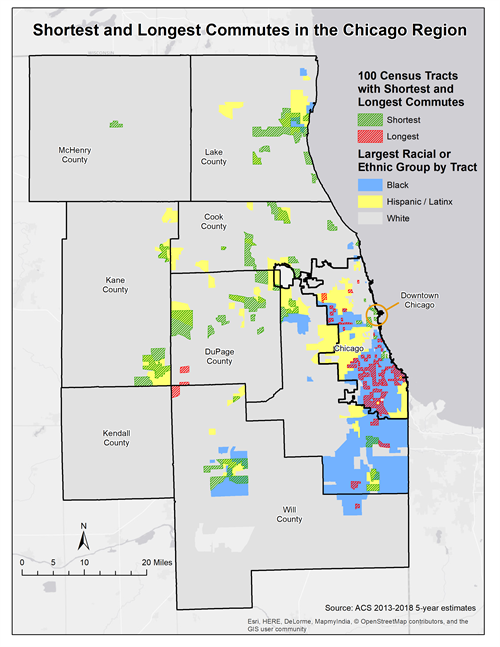Equity in Transportation

Whether for work, play, or personal growth, access to opportunity is not equitable

Issue
In almost every American city, people of color have less access to jobs, education, recreation and services than white people. At the same time, they are disproportionately impacted by the negative externalities, like noise and pollution, that are associated with transportation infrastructure. This is a direct result of biased – and sometimes explicitly racist – policies and planning practices.
A great way to visualize this is by examining commute times in the six-county Chicago region. For decades, federal and state policies have prioritized investment in auto-oriented transportation at the expense of transit. At the same time, many people of color have been forced into areas of the region that are disconnected from economic opportunity. This creates a cycle where people of color and those with lower incomes experience worse mobility outcomes, as these populations have poor access to needed transit or are less likely to own cars. This map reflects 100 census tracts of our region, and over 90 of those tracts have a majority of African Americans experiencing the longest commute times. The effects are cumulative: The National Bureau of Economic Research has shown that long commute times play a significant role in predicting residents’ upward mobility. This is just one example of the many ways that inequitable access leads to less opportunity.
Solutions
By intentionally centering racial equity, our region will be able to substantively improve mobility outcomes for marginalized communities. Structurally, we need to rethink how local and state governments engage with communities of color and how to prioritize our transportation investments. The private sector also has a role to play in helping to dismantle transportation barriers to employment. MPC is working with our partners to ensure that we are applying a racial equity framework to transportation planning decisions. Here is a closer look at some of our work:
Centering Equity In Transportation Planning
Prioritizing Transportation Investments With an Equity Lens
Performance-based planning is a data-informed planning practice that increases transparency, sets long-term investment goals, and delivers results. It is considered a best practice in the transportation sector and is becoming widely adopted at state and local levels. MPC has researched how other regions have incorporated racial equity into this emerging practice, and what we can do in the Chicago region to improve.
Understanding Mobility Barriers For Marginalized Communites
Mobility In and Beyond Communities
Marginalized communities face a host of complex transportation barriers that erect roadblocks to opportunity. How can we begin to understand mobility needs and design solutions? It’s simple: listen. MPC partnered with Equiticity, a mobility justice organization, and researchers from the University of Illinois at Chicago to conduct a series of open-ended focus groups designed to answer a simple question: what do you need?
Partnering With Employers to Close the Mobility Gap For Disconnected Communities
Employer Solutions for Disconnected Workers
In the Chicago region, 2.8 million people live in economically disconnected areas, which are mostly low-income communities of color. They struggle to secure and retain consistent employment because of long, difficult commutes. The resulting absenteeism and high turnover hurt the ability to build wealth, and in turn, hurts employers’ bottom line. However, it is possible to meet the needs of both through an employer-provided transportation solution. MPC partnered with BCG to develop a toolkit that helps employers stand up a program that closes the mobility gap for their workforce.
